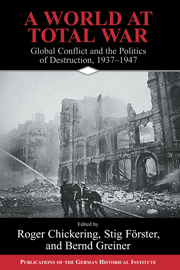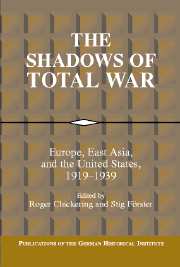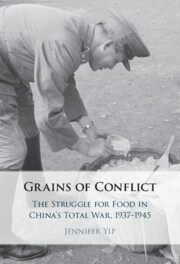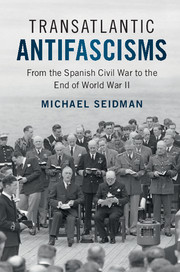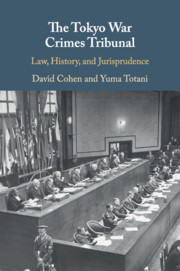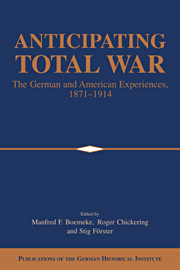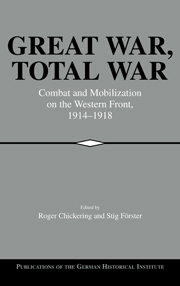A World at Total War
This volume presents the results of a fifth and final conference on the history of total war. It is devoted to the Second World War, which many scholars regard as the paradigmatic instance of total war. In considering the validity of this proposition, the authors address a broad range of analytical problems that this vast conflict posed in the arenas of Europe and Asia. They analyze modes of combat, war aims, the mobilization of economies and societies, occupation regimes, the vulnerability of noncombatants, and the legal and moral issues raised by the industrialized warfare of the mid-twentieth century. The volume will be of interest to all students of war and society in the modern era.
- Fifth and final volume of the conference on total war
- Focuses on World War II, regarded as the paradigmatic instance of total war
- Wide range of topics covered, from analysis of combat to moral and legal issues raised
Reviews & endorsements
Review of the hardback: 'Within the covers of this book is such a wealth of information that it makes it almost compulsory reading for any student of WW2.' Open History
Product details
March 2005Hardback
9780521834322
408 pages
229 × 152 × 27 mm
0.77kg
Available
Table of Contents
- Introduction: are we there yet? World War II and a theory of total war Roger Chickering and Stig Förster
- Part I. The Dimension of War:
- 1. Total war: the global dimensions of conflict Gerhard L. Weinberg
- 2. Total war: the conduct of war, 1939–1945 Hew Strachan
- 3. The ultimate horror: total war and genocide Stig Förster and Myriam Gressler
- Part II. Combat:
- 4. Germany and the Battle of the Atlantic Holger Herwig
- 5. From 'Blitzkrieg' to 'total war': Germany's war in Europe Jürgen Förster
- 6. Global yet not total: the US war effort and its consequences Dennis Showalter
- Part III. Mobilizing Economies:
- 7. The USSR and total war: why didn't the Soviet economy collapse? Mark Harrison
- 8. Blood, sweat, and tears: British mobilization for World War II Stephen Broadberry and Peter Howlett
- 9. The impact of compulsory labor on German society at war Hans Mommsen
- Part IV. Mobilizing Societies:
- 10. Fantasy, reality, and modes of perception in Ludendorff's and Goebbels' concepts of 'total war' Martin Kutz
- 11. The Home Front in 'total war': women in Germany and Britain in the Second World War Jill Stephenson
- 12. Women in the Soviet war effort John Barber
- 13. The spirit of St Louis: mobilizing American politics and society 1937–1945 Bernd Greiner
- Part V. The War against non-Combatants:
- 14. Partisan war in the Belorussia, 1941–1944 Hans-Heinrich Nolte
- 15. Allied bombing and the destruction of German cities Richard Overy
- 16. 'Accidental judgments, casual slaughters': Hiroshima, Nagasaki and total war Robert Messer
- Part VI. Criminal War:
- 17. Sexual violence and its prosecution: courts martial of the Wehrmacht Birgit Beck
- 18. Ideologies of difference and the turn to atrocity: Japan's war on China Louise Young
- 19. On the road to total retribution? The international debate on the punishment of war crimes, 1872–1945 Daniel Segesser
- Conclusion:
- 20. Some concluding reflections Michael Howard.

